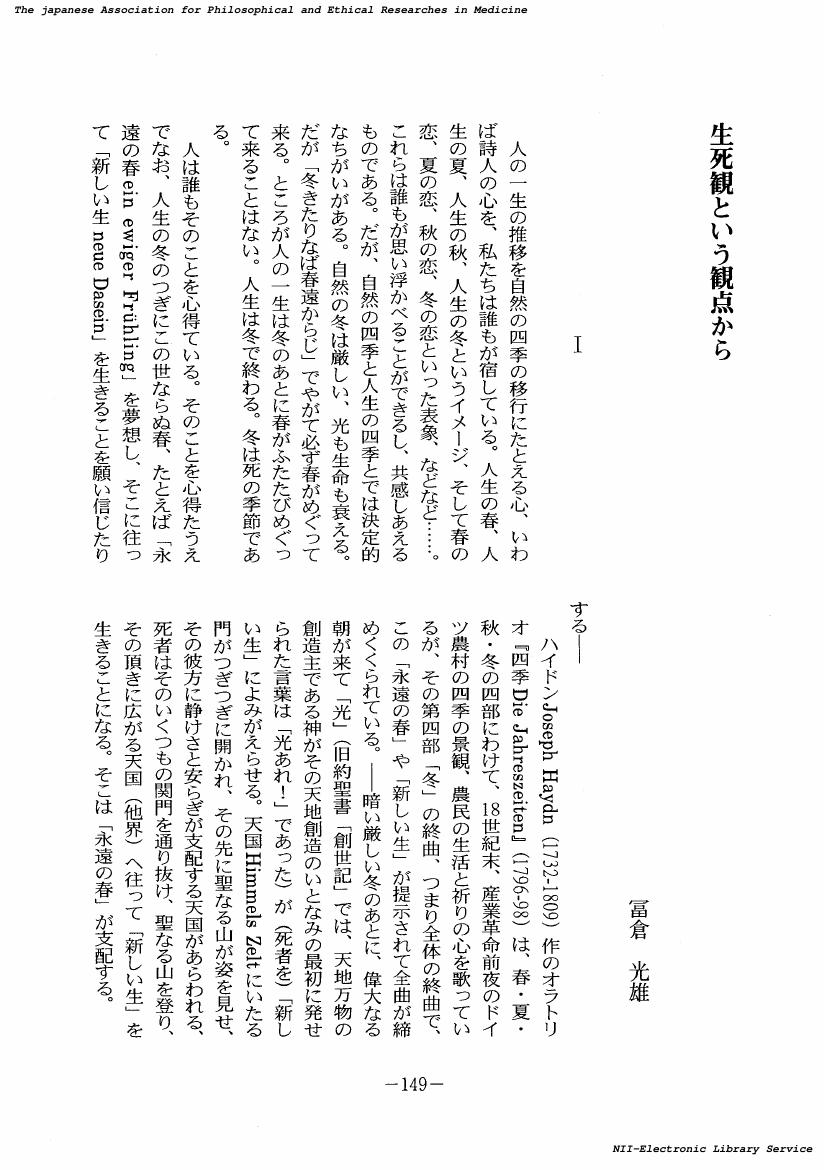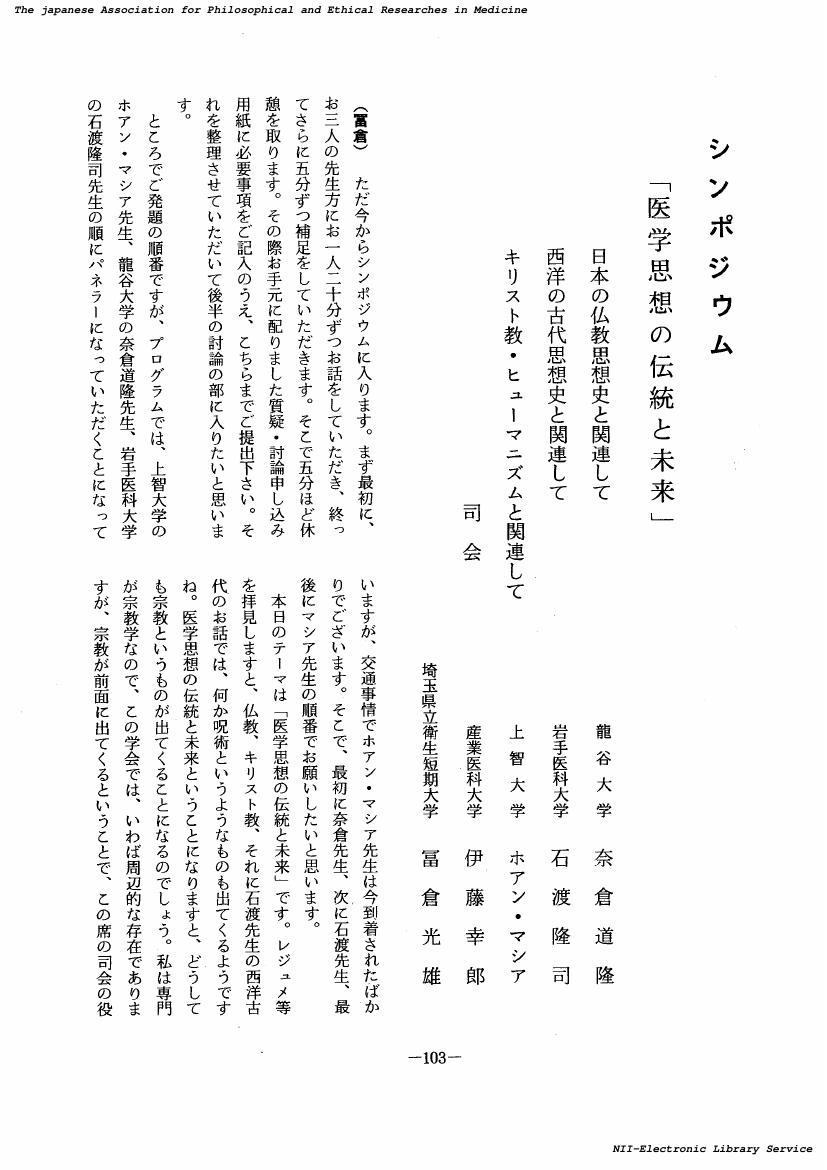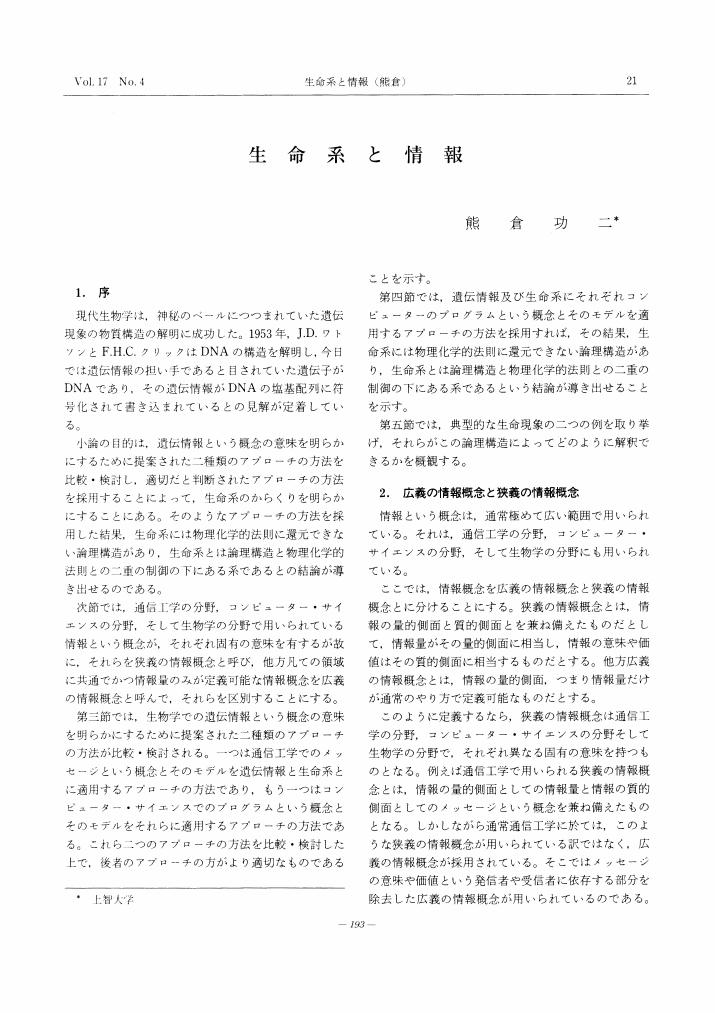1 0 0 0 OA ケアの概念を深めるために(ワークショップの概要(第20回大会))
- 著者
- 朝倉 輝一
- 出版者
- 日本医学哲学・倫理学会
- 雑誌
- 医学哲学 医学倫理 (ISSN:02896427)
- 巻号頁・発行日
- vol.23, pp.131-134, 2005-10-26 (Released:2018-02-01)
1 0 0 0 OA 看護ケアにおける良心と責任の問題
- 著者
- 朝倉 輝一
- 出版者
- 日本医学哲学・倫理学会
- 雑誌
- 医学哲学 医学倫理 (ISSN:02896427)
- 巻号頁・発行日
- vol.23, pp.43-53, 2005-10-26 (Released:2018-02-01)
Nurses often face ethical dilemmas involving issues of conscience and responsibility. Etymologically, "conscience" (συνειδησιs, conscientia) involves getting to know meaning of one's own act together with the internalized other. In order for a person to protect his or her identity when exposed to danger, conscience is "the internal surveillance organization" which judges orders according to his or her subjective restraint-norm" in relation to a specific act and features "a cognitive element and an influence-element". Not only does it mean the internal moral sense for distinguishing right from wrong freedom of an inside, but also it is inevitably accompanied by an external act in some form, such as an act or an omission. It is possible, however, that one's appeal to conscience makes a wrong decision because of incorrect information, groundless belief etc. But nurses should be allowed to refuse to carry out particular treatment or procedures based on personal appeal to conscience. Therefore the nurse appealing to conscience must undertake a step-by-step process of justification in order to fulfill a duty of care by carefully considering the patient's safety and welfare, based on acceptance of consequence and exact information. Administrators must discern whether the nurse appealing to conscience makes judgment based on appropriate knowledge and correct information and whether the proposed result is safe and acceptable. If so, administrators have a duty to support that result.Although the appeal to conscience is a fundamental right and can reveal someone's dishonesty (the whistle-blowing), it is not positively accepted in Japan. The dignity of each person's identity cannot be protected only by nurse's appeal to conscience. Consequently nursing practice committees or other ethics committees should discuss this and similar issues which include refusal based on a nurse's appeal to conscience.
1 0 0 0 OA 「健康概念の再検討-病気と幸福の間-」のまとめ(健康概念の再検討-幸福と病気の間-)
- 著者
- 倉持 武 森下 直貴
- 出版者
- 日本医学哲学・倫理学会
- 雑誌
- 医学哲学 医学倫理 (ISSN:02896427)
- 巻号頁・発行日
- vol.22, pp.161-162, 2004-10-18 (Released:2018-02-01)
- 著者
- 岩倉 孝明 村岡 潔
- 出版者
- 日本医学哲学・倫理学会
- 雑誌
- 医学哲学 医学倫理 (ISSN:02896427)
- 巻号頁・発行日
- vol.21, pp.222-225, 2003-10-05 (Released:2018-02-01)
1 0 0 0 OA 医療におけるケア概念と他者の問題
- 著者
- 朝倉 輝一
- 出版者
- 日本医学哲学・倫理学会
- 雑誌
- 医学哲学 医学倫理 (ISSN:02896427)
- 巻号頁・発行日
- vol.21, pp.55-70, 2003-10-05 (Released:2018-02-01)
The fact that the conception of care has drawn our attention expands the definition of the moral realm of Kantian moral theory. It means that we must listen attentively to the "excluded other." And we must resolve the dichotomy between "reason, culture, and law belonging to man" and "nature and sensation belonging to woman." Therefore the concept of care should make us think anew about the relationship between care and the other in health care. Because I do not think that a modern moral theory that includes care which adequate to the way of life lived in complex modern societies can be formulated without some universalist specification of impartiality, I find it more fruitful to construct the concept of care not as a rejection of universalism, but rather as a contribution to the development of a non-formalist, contextually senstive, and postconventional understanding of ethical life. I will describe two conceptions of "care and the other" that delineate both moral perspectives and interactional structures in health care. Following Seyla Benhabib, I shall refer to the first as the standpoint of the "generalized" and the second as the "concrete" other.
1 0 0 0 OA 生死をめぐる日本人の意識
- 著者
- 奈倉 道隆
- 出版者
- 日本医学哲学・倫理学会
- 雑誌
- 医学哲学 医学倫理 (ISSN:02896427)
- 巻号頁・発行日
- vol.17, pp.260-265, 1999-10-01 (Released:2018-02-01)
With remarkable developments in palliative care, we can surely control the physical pain of patients with serious disease. However, it may be more painful for patients to live with the fear of death as they wait for death to finally occur. The sense of life harbored in Japanese is quite different from that of western countries where life is based on modern science. Many Japanese patients with incurable diseases prefer not to undergo aggressive treatments which can only delay the time of death. Many Japanese are averse to the organ transplans from brain dead donors, because they believe that body is tightly associated with the soul and can hardly recognize that brain death is real death. Patients in the terminal state develop not only an independent mind which seelks maturity as a human being, but also a dependent mind which fears isolation from other people. They usually hesitate to request anything in order not to trouble others, while at the same time, they also want others to comply with all their request. Japanese people don't like to complain about the fear of death, because they have their own culture in which one's death becomes honorable if he/she accepts it as a natural process. Therefore, Japanese patients tend to suppress their fear of death and some manifest physical symptoms as a result. Most Japanese patients don't intend to express theemselves after they perceive that death is coming. They would like to continue their usual way of living until death, and wish to die without suffering during their sleep.
1 0 0 0 OA 医療コミュニケーションとしてのインフォームド・コンセント : 討議倫理学の立場から
- 著者
- 朝倉 輝一
- 出版者
- 日本医学哲学・倫理学会
- 雑誌
- 医学哲学 医学倫理 (ISSN:02896427)
- 巻号頁・発行日
- vol.17, pp.32-41, 1999-10-01 (Released:2018-02-01)
It is the purpose of this paper to argue the possibility of the application of discourse ethics (Diskursethik) to informed consent in bio-medical ethics. Discourse ethics, in general, is conceived as intersubjective acknowledgement of the validity-claims in acts of linguistic communication. The great progress in medical techniques is transforming the problems of substantial justification, i. e. grammar of life-form. Biomedical ethics also should take this current of time into consideration. The concept of informed consent forms important part of self-determination in medical care. It consists of the autonomy of the patient. And autonomy or self-detemination in medical care makes conditions for the patient's own intention, understanding and non-controlled. Self-determination in medical care contains the resistance to the abuse of paternalism in medical care and bio-medical experiments. But it is necessary in medical care,as many authors have pointed out,to balance self-determination, nonmaleficience and beneficience. Then what are these concepts founded on ? From the discourse ethics's view, self-determination (autonomy) and beneficience in informed consent adhere in dialogical communication as the validity-claims in acts of linguistic communication. The validity-claims are explicated through speech-act theory or pragmatics. Discourse ethics was proposed by J. Habermas about thirty years ago, but it seems there are few application studies. We are expecting more studies about the application of discourse ethics to medical care.
- 著者
- 倉持 武
- 出版者
- 日本医学哲学・倫理学会
- 雑誌
- 医学哲学 医学倫理 (ISSN:02896427)
- 巻号頁・発行日
- vol.16, pp.151-157, 1998-10-01 (Released:2018-02-01)
For what purpose should a person, while living or in death, be used? This is the crucial issue of a human's 'Wesen'. Namely, a human being's 'Wesen' requires that one be treated, during life itself and even in death, as an entity with its own reghts. Therefore, if through one's own right of self-decision, we try to justify the use of one's body for the act of organtransplantation, the nature of the patient's, for example that of brain dead, intentions as well as clear legal standards must be formally defined. In cases in which certain endeavours do not violate a person's 'Wesen', when expression of the volition of represontative in the form of consent with sufficiently precise information is acquired, then the possibility of representative with legal authority can be considered. However, when the violation of 'Wesen' is involved, it is requisite that the said person must state, through a formal written declaration, that his or her body can be used as a means for a certain purpose. Furthermore, the creation of a third party's right to decide on the use of the said patient's body is also essential. Therefore, in this case, a consenting representative inevitably won't be effectuated.
1 0 0 0 OA 生死観という観点から(<特集>日本人の心身観と医療)
- 著者
- 冨倉 光雄
- 出版者
- 日本医学哲学・倫理学会
- 雑誌
- 医学哲学 医学倫理 (ISSN:02896427)
- 巻号頁・発行日
- vol.15, pp.149-156, 1997-09-20 (Released:2018-02-01)
1 0 0 0 OA 生活者主体のヘルスケアとわが国の文化的特性(<特集>看護の倫理とヘルスケアの本質)
- 著者
- 奈倉 道隆
- 出版者
- 日本医学哲学・倫理学会
- 雑誌
- 医学哲学 医学倫理 (ISSN:02896427)
- 巻号頁・発行日
- vol.14, pp.174-176, 1996-10-01 (Released:2018-02-01)
- 著者
- 遠藤 正樹 阿萬 由起子 大倉 民江
- 出版者
- 日本医学哲学・倫理学会
- 雑誌
- 医学哲学 医学倫理 (ISSN:02896427)
- 巻号頁・発行日
- vol.14, pp.57-68, 1996-10-01 (Released:2018-02-01)
Medical social workers have to meet a wide range of needs of patients and their families as citizens and persons involved in the total daily medical care. Especially in transplantation treatment the existence of social workers is indispensable for helping patients with their own decisions for their own benefit from psychological and social viewpoints. In actual team medical care, it is important to promote the medical staff 's further understanding of patients with regard to the advocacy and respect of their own thinking from the standpoint of a third party. The role and importance of social workers in transplantation treatment is discussed, torough a case the authors were involved in, by examining the process of self-decisions by a patient and his family. The actual case here was a patient who, as a citizen, desired a heart transplant after many years of fighting against diastolic cardiomyopathy and succeeded in receiving it in the United States. The importance of medical social workers has not been fully recognized in Japan. As a result there is still a persistent shortsighted view that their role is no more than to exhort and persuade patients in response to their complaints. This paper discusses and tries to define the differences in roles and specialties between transplant coordinators and social workers as the key persons in transplantation treatment on the basis of the actual case and a field report on the actual heart transplant in the United States.
1 0 0 0 OA インフォームド・コンセントとソーシャル・ワーク(パネルディスカッション インフォームド・コンセントとは何か,<特集>病とは何か・癒しとは何か インフォームド・コンセントとは何か)
- 著者
- 大倉 民江
- 出版者
- 日本医学哲学・倫理学会
- 雑誌
- 医学哲学 医学倫理 (ISSN:02896427)
- 巻号頁・発行日
- vol.13, pp.164-168, 1995-10-01 (Released:2018-02-01)
1 0 0 0 OA インフォームド・コンセント : 宗教学の立場から(パネルディスカッション インフォームド・コンセントとは何か,<特集>病とは何か・癒しとは何か インフォームド・コンセントとは何か)
- 著者
- 冨倉 光雄
- 出版者
- 日本医学哲学・倫理学会
- 雑誌
- 医学哲学 医学倫理 (ISSN:02896427)
- 巻号頁・発行日
- vol.13, pp.169-173, 1995-10-01 (Released:2018-02-01)
- 著者
- 奈倉 道隆 大倉 民江
- 出版者
- 日本医学哲学・倫理学会
- 雑誌
- 医学哲学 医学倫理 (ISSN:02896427)
- 巻号頁・発行日
- vol.13, pp.115-122, 1995-10-01 (Released:2018-02-01)
In Japan, informed consent (IC) is not carried out satisfactorily in order to improve the situation, medical social work (MSW) is essential. While the need for MSW is increasing, it is yet recognized in the medial world of japan in four of the reasons for this fact are as follow (1) Medical doctors take the initiative in the field of medicine and patients become more passive. As a result publish do not try to ask for MSW support. (2) In Japan, medicine only means diagnosis, treatment or nursing of diseases. Solution psychological or social problems of a patient are not considered medical matters, even though they may be related to disease or treatment. (3) Right now, medicine is not administered through team work, and MSW, activities which received patient asking and coordination of medical activities do not operate smoothly yet. (4) In Japan people tend to think that maintaining a good relationship is much more important than realizing their own will or desire. These four factors hinder IC. Now it is necessary to solve these problems. The solution of this problem would also bring the proper situation to make progress IC and establish MSW concretely, which would contribute to IC.
1 0 0 0 OA 転換期医療における医療実践者の課題(シンポジウム 転換期医療における人間の問題)
- 著者
- 奈倉 道隆
- 出版者
- 日本医学哲学・倫理学会
- 雑誌
- 医学哲学 医学倫理 (ISSN:02896427)
- 巻号頁・発行日
- vol.10, pp.143-150, 1992-10-23 (Released:2018-02-01)
The technical improvements in medication in the late twentieth century have caused a great change in the relationship between medical specialists and patients. Medical specialists tend to treat a patient as a pure object of technology; they tend to take into account only information as to the patient's physical conditions, which is derived from high-tech medical tests. But it must be noted that many diseases such as adult diseases cannot be cured by technological means only. In those cases, medical specialists have to care not only for the patient's body, but also for the patient's psychological conditions, social relations, and so on. In the field of "ultramodern medication", medical specialists intervene directly in the life and death of the human being by using the technologies of reproductive-medicine and those of transplantation-medicine. Such interventions are ethical, I think, only on the conditions that 1) patients are well informed about those treatments and they themselves want them voluntarily, and 2) there is a social agreement on utilizing those treatments.
1 0 0 0 OA 医学思想の伝統と未来
- 著者
- 奈倉 道隆 石渡 隆司 マシア ホアン 伊藤 幸郎 冨倉 光雄
- 出版者
- 日本医学哲学・倫理学会
- 雑誌
- 医学哲学 医学倫理 (ISSN:02896427)
- 巻号頁・発行日
- vol.6, pp.103-130, 1988-07-31 (Released:2018-02-01)
1 0 0 0 OA 老年の医療と仏教思想 : 新時代の医学思想を求めて
- 著者
- 奈倉 道隆
- 出版者
- 日本医学哲学・倫理学会
- 雑誌
- 医学哲学 医学倫理 (ISSN:02896427)
- 巻号頁・発行日
- vol.5, pp.89-97, 1987-07-10 (Released:2018-02-01)
1 0 0 0 OA バイオエシックスへの視座
- 著者
- 栗原 康 奈倉 道隆 菅野 耕毅 大槻 真一郎 本多 正昭
- 出版者
- 日本医学哲学・倫理学会
- 雑誌
- 医学哲学 医学倫理 (ISSN:02896427)
- 巻号頁・発行日
- vol.3, pp.120-151, 1985-07-05 (Released:2018-02-01)











